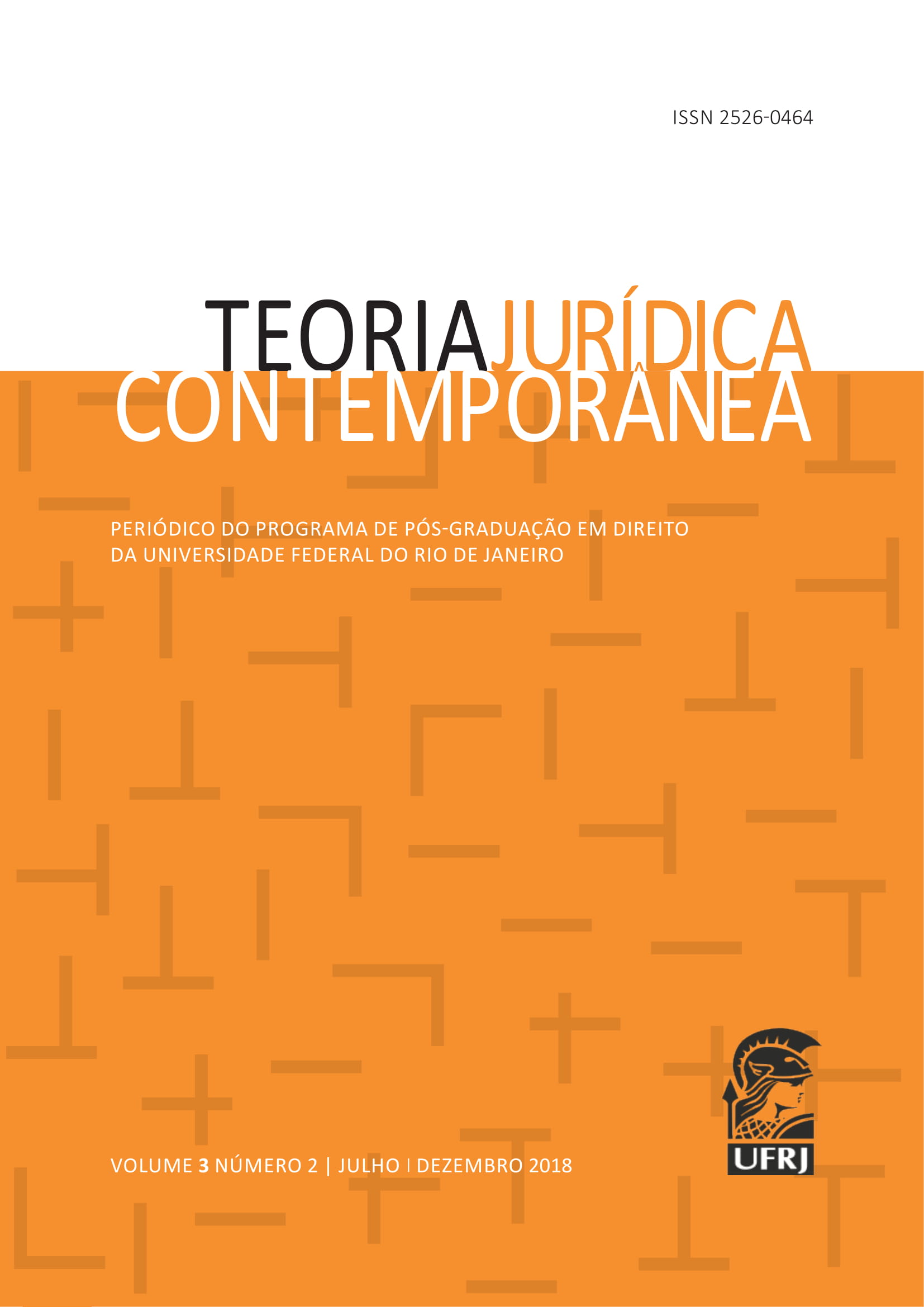Cinco desafios para uma teoria do direito
DOI:
https://doi.org/10.21875/tjc.v3i2.19655Palavras-chave:
Grounding, Superveniência, Direito como fatoResumo
RESUMO:
Neste artigo, enuncio cinco desafios intuitivos a serem enfrentados por uma teoria do direito. Na sequência, argumento que a ideia tipicamente positivista de que as atribuições jurídicas possam estar assentadas exclusivamente em fatos descritivos parece conflitar com três deles. Concluo, assim, que a despeito de tanto o interpretativismo quanto o descritivismo serem nalguma medida teorias contraintuitivas, é sobre o segundo que recai um maior ônus argumentativo.
ABSTRACT:
In this paper, I introduce five intuitive challenges that should be dealt with by theories of law. Then, I argue that the typically positivist idea that the legal ascriptions of a given legal system may be grounded exclusively on descriptive facts seems to conflict with three of those challenges. I conclude that in spite of the fact that both interpretivism and descriptivism are counterintuitive theories about law, it is the latter that has a greater argumentative burden.
Downloads
Referências
BENNETT, K. Making Things Up. Oxford: Oxford University Press, 2017.
BROZEK, B.; ROTOLO, A.; STELMACH, J. (ed.). Supervenience and Normativity. Switzerland: Springer, 2017. DICKSON, J. Evaluation and Legal Theory. Oxford: Hart, 2001.
DWORKIN, R. Law’s Empire. Cambridge, MA: The Belknap Press of Harvard University Press, 1986.
GREENBERG, M. How facts make law. Legal Theory, Cambrige, n. 10, 2004, p. 157–98.
JACKSON, F. From Metaphysics to Ethics: A Defense of Conceptual Analysis. New York: Oxford University Press, 1998.
JACKSON, F. 2017. In Defense of Reductionism in Ethics. In: SINGER, P. (ed.). Does Anything Really Matter? Essays on Parfit on Objectivity. Oxford: Oxford University Press, 2017, p. 195–211.
HART, H. L. A. The Concept of Law. Oxford: Clarendon Press, 1994.
KIM, J. Postscripts on Supervenience. In Supervenience and Mind: Selected Philosophical Essays. Cambridge: Cambridge University Press, 1993, p. 161-171.
LIMA, F. On the-Law Property Ascriptions to the Facts. Ratio Juris: An International Journal of Jurisprudence and Philosophy of Law, v. 31, n. 2, 2018, p. 231-50.
PLUNKET, D. A Positive Route For Explaining How Facts Make Law. Legal Theory, n.18, 2012, p. 139-207.
RAZ, J. Kelsen’s Theory of the Basic Norm. American Journal of Jurisprudence, v.19, n. 1, 1974, p. 94-111.
RAZ, J. Between Authority and Interpretation: On the Theory of Law and Practical Reason. Oxford: Oxford University Press, 2009.
ROSEN, G. Metaphysical Dependence: Grounding and Reduction. In: HALE, B. HOFFMAN, A (ed.). Modality: Metaphysics, Logic, and Epistemology. New York: Oxford University Press, 2010, p.109-136.
SCHAUER, F. Law as a Malleable Artifact. In: BURAZIN, L. HIMMA. K. ROVERSI. C (ed.). Law as an Artifact. Oxford: Oxford university Press, 2018, p. 29-43.
SHAPIRO, S. J. The “Hart-Dworkin” Debate: A Short Guide for the Perplexed. University of Michigan Public Law and Legal Theory Working Paper, n. 77, 2007. Disponível em: https://doi. org/10.2139/ssrn.968657.
SHAPIRO, S. J. What Is Law (and Why Should We Care)? In: Legality. Cambridge, MA: The Belknap Press, 2011.
TAMANAHA, B. Necessary and Universal Truths about Law? Ratio Juris: An International Journal of Jurisprudence and Philosophy of Law, v. 30, n. 1, 2017, p. 3-24.
TROGDON, K. An Introduction to Grounding. In: Varieties of Dependence. In: HOELTJE, M., SCHNIEDER, B. STEINBERG, A. (ed.). Philosophia Verlag, 2013, p. 97-122.
Downloads
Publicado
Edição
Seção
Licença
Os autores que publicam nesta revista concordam com os seguintes termos:
- Os autores mantêm os direitos autorais e concedem à revista o direito de primeira publicação, com o trabalho simultaneamente licenciado sob a Licença Creative Commons Attribution que permite o compartilhamento do trabalho com reconhecimento da autoria e publicação inicial nesta revista.
- Os autores têm autorização para assumir contratos adicionais separadamente, para distribuição não-exclusiva da versão do trabalho publicada nesta revista (ex.: publicar em repositório institucional ou como capítulo de livro), com reconhecimento de autoria e publicação inicial nesta revista.
- Os autores têm permissão e são estimulados a publicar e distribuir seu trabalho online (ex.: em repositórios institucionais ou na sua página pessoal) a qualquer ponto antes ou durante o processo editorial, já que isso pode gerar alterações produtivas, bem como aumentar o impacto e a citação do trabalho publicado (Veja O Efeito do Acesso Livre).
Este obra está licenciado com uma Licença Creative Commons Atribuição-CompartilhaIgual 3.0 Brasil.


